#coronavirus epidemic
Explore tagged Tumblr posts
Text
H5N1: What to know before fear spreads
What is H5N1?
H5N1 is a 1996 strain of the Spanish or Avian Flu first detected in Chinese birds before spreading globally across various avian species. H5N1 is similar to H1N1, but spreads slower and has a much higher mortality rate.
H5N1 may also be referred to as Influenza A. The American Association of Bovine Practitioners has seen fit to rename H5N1 to Bovine Influenza A Virus, or BIAV, and are encouraging others to use the same terminology.
I would not be surprised if the colloquial name among the public becomes Bovine Flu or American Flu in the coming months, and may be referred to as the Chinese Flu by the same folks who took the spark of the SARS-CoV-2 (COVID-19) pandemic as an excuse to be publicly racist to East Asian people without social repercussions.
BIAV is a virus, meaning that it is a (probably) non-living packet of self-replicating infectious material with a high rate of mutation. BIAV is structured similarly to SARS-CoV-2, having a packet of infectious material encased in a spherical shell with a corona, or crown, of proteins that can latch to living cells to inject RNA.
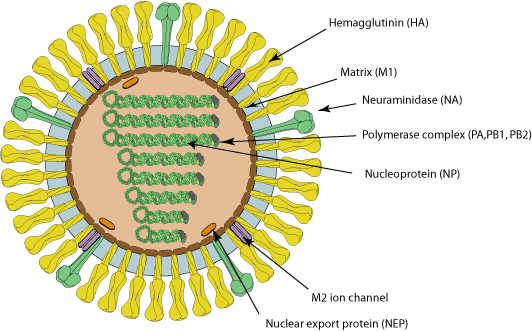
Image source with interactive model: ViralZone - H5N1 subtype
What is the history of BIAV?
In 1996 and 1997, an outbreak of BIAV occurred among poultry and infected 18 people in Hong Kong, 6 of which died. This seemingly isolated incident then infected ~860 people with a >50% death rate.
At the time, BIAV was known as Highly Pathogenic Avian Influenza, or HPAI, and killed nearly 100% of chickens within a 48 hour period.
From 2003 to 2005, continual outbreaks occurred in China and other East Asian countries, before spreading to Cambodia, the Netherlands, Thailand, and Vietnam.
From 2014 to 2016, it began being detected in American fowl, as well as mutating the H5N6 (lethal in birds, no human to human transmission) and H5N8 (largely spread through turkeys, ducks had immunity) viruses.
BIAV has since evolved into a clade known as 2.3.4.4b, and was first detected in 2021 in wild American birds. This then caused outbreaks in 2022 among wild and domesticated birds (such as chickens) alike, but was largely being overshadowed by the pressing SARS-CoV-2 pandemic at the time.
From 2022 to 2023, it was observed to be spreading among various mammals, including humans. Now, in 2024, we're having the most concerning rapid outbreak of BIAV since 2003.
BIAV is known to spread from mammal to mammal, particularly between cows and humans. BIAV may also be spread from cow to cow (highly likely, but not confirmed - this is likely the reason the virus has spread to Idaho from Texan cattle), and is known to be lethal to domestic cats and birds within 48 hours.
How does BIAV spread?
BIAV spreads through fomites - direct contact with infected animals or infected surfaces and then touching parts of your face or other orifices - as well as through airborne particulates, which may be inhaled and enter the sinuses and lungs.
BIAV is known to spread through:
Asymptomatic Ducks, geese, swans, various shorebirds
Symptomatic, may be lethal Foxes, bears, seals, sea lions, polar bears, domestic cats, dogs, minks, goats, cows, (potentially human to human, but unconfirmed - there have only been 8 potential human to human cases in 2024).
How can I protect against BIAV?
As BIAV is a type of Influenza A, existing protocols should do fine.
Current recommendations are to wash your hands vigorously after interacting with birds (I would also recommend doing this with mammals), avoid touching your face or other open orifices, and wear N95 masks.
Avoid sick or dead animals entirely - I would also recommend reporting them to your local Animal Control or veterinary centre and warning them about the infection risk. People who work with animals are recommended to also wear full PPE such as N95 masks, eye protection, gloves, and partake in vigorous hand washing.
If you suspect you've caught BIAV, seek medical attention immediately. Existing medications such as oseltamivir phosphate, zanamivir, peramivir, and baloxavir marboxil can reduce BIAV's ability to replicate.
Standard flu shots will not protect against BIAV. Remember - symptoms of BIAV may not manifest for between 2 to 8 days, and potentially infected people should be monitored for at least 10 days.
How far has BIAV spread?
BIAV is currently a global virus, though the current infection location of note is the United States.
Image Key: Dark red - Countries with humans, poultry and wild birds killed by H5N1 Deep red - Countries with poultry or wild birds killed by H5N1 and has reported human cases of H5N1 Light red - Countries with poultry or wild birds killed by H5N1
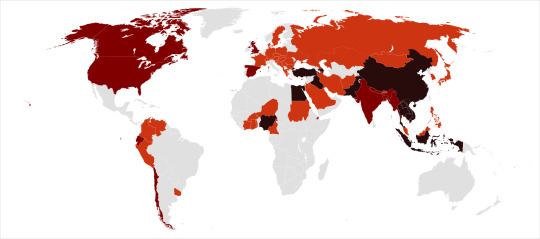
Image source: Wikipedia - Influenza A virus subtype H5N1 - File: Global spread of H5N1 map
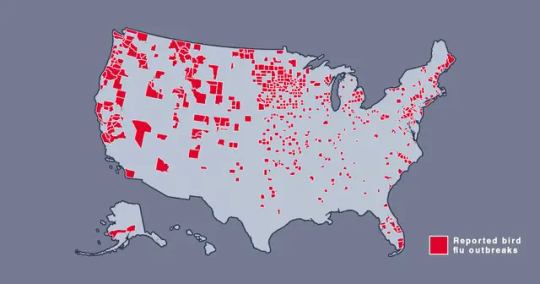
Image source: Metro.co.uk - Map shows where bird flu is spreading in US amid new warning - File: The Centers for Disease Control and Prevention’s H5N1 bird flu detections map across the United States
Should I be afraid?
You needn't be afraid, just prepared. BIAV has a concerningly high lethality, but this ironically culls its spread somewhat.
In the event human to human transmission of BIAV is confirmed, this will likely mainly affect marginalized communities, poor people, and homeless people, who are likely to have less access to medical care, and a higher likelihood of working in jobs that require frequent close human contact, such as fast food or retail jobs.
Given the response to SARS-CoV-2, corporations - and probably the government - may shove a proper response under the rug and refuse to participate in a full quarantine, which may leave people forced to go to work in dangerous conditions.
If this does spread into an epidemic or pandemic, given our extensive knowledge about Influenza, and the US having a backup vaccine for a prior strain of H5N1, a vaccine should be able to be developed relatively quickly and would hopefully be deployed freely without charge - we won't have to worry about a situation like The Stand.
Wash your hands, keep clean, avoid large social gatherings where possible, wear an N95 mask if you can afford them (Remember: Cloth masks are the least protective, but are better than nothing. If you can't afford N95 masks, I recommend wearing a well-fitted cloth mask with a disposable face mask over it to prevent pneumonia from moisture buildup in the disposable mask), support the disabled, poor, and homeless, and stay educated.
We can do better this time.
Further things to check out:
YouTube: MedCram - H5N1 Cattle Outbreak: Background and Currently Known Facts (ft. Roger Seheult, M.D.)
Wikipedia - Influenza A virus subtype H5N1
Maine.gov - Avian Influenza and People
CDC.gov - Technical Report: Highly Pathogenic Avian Influenza A(H5N1) Viruses
Wikipedia - H5N1 genetic structure
realagriculture - Influenza infection in cattle gets new name: Bovine Influenza A Virus (BIAV)
#H5N1#bird flu#avian flu#bovine flu#BIAV#pandemic#epidemic#COVID 19#coronavirus#spanish flu#long post#text post#no id#undescribed#news#politics#us news#us politics#american news#american politics#world news#global news#global politics#world politics#lgbt#lgbtq#queer#trans#communist#socialist
51 notes
·
View notes
Text
Also preserved in our archive (Daily updates!)
By Faras Ghani
Some 4.5 billion people worldwide are currently without adequate access to essential healthcare services, according to the World Health Organization (WHO).
This comes as more than 100,000 cases of mpox and at least 200 deaths have been confirmed globally, according to the European Centre for Disease Prevention and Control, with the WHO declaring it a public health emergency earlier this year.
The ongoing cholera outbreak in Sudan alone has affected almost 15,000 people with at least 473 deaths reported, according to the country’s health ministry.
A new COVID-19 variant has spread across 27 countries, infecting hundreds of people.
At the 2024 World Economic Summit, it was also revealed that antimicrobial resistance (AMR) has become the leading cause of death globally and could kill 10 million people by 2050.
A report titled Quantifying the Impact of Climate Change on Human Health, launched earlier this year, predicts that by 2050, an additional 14.5 million deaths could occur due to climate change as well as $12.5 trillion in economic losses globally.
With healthcare systems across the world already under extra stress, they could face an additional $1.1 trillion burden due to the impact of climate change, the report added.
Al Jazeera spoke to Dr Ahmed Ogwell, vice president of global health strategy at the United Nations Foundation and former deputy director general for the Africa Centres for Disease Control and Prevention (CDC), on the current state of healthcare, the risk of infections and diseases across the globe and whether the world has learned any lessons from the coronavirus pandemic.
Al Jazeera: Let’s start with the general health situation of the world. What risk level are we talking about with infections and diseases?
Ogwell: For the general health of the world, I’d put the temperature at moderate risk right now. We are in the middle of a public health emergency of international concern that is the mpox multi-country outbreak. It means that we need to be in heightened surveillance and ensuring we have the health tools that we need and that we also need to be improving the way we work together as a global community.
Secondly, there are increasing numbers of disease outbreaks – not just disease threats – including mpox, dengue fever, cholera, polio etc. And we still have effects of COVID on health systems. The world is still not comfortable when it comes to health issues.
Finally, the current geopolitical situation. We need to be coming together as a globe to address these issues because they are very international and cross-border in nature. But the situation is still hindering the delivery of a more united front to address global health. The world is at a moderate risk and can go either way, depending on what we do as a global community.
A heightened level of preparedness is required. There is a lot more we can do to make the situation more comfortable.
Al Jazeera: You spoke about preparedness. Is the world prepared for another pandemic? Did we learn any lessons from COVID?
Ogwell: Well, the lessons we should have learned from COVID, we did not. You see how we wore our masks, washed our hands, sanitised and kept our distance during the pandemic. Today, the situation has been completely forgotten. You don’t see anyone really wearing masks even when they are sneezing their heads off. That’s why we are struggling with controlling things we should have been able to.
At the healthcare level, the systems we put in place should have clicked in globally to address the potential outbreak of diseases. These systems were folded up when COVID passed. For example, the temperature scanning machines at airports. It means the very basic screening mechanism of someone who is feverish is not there.
At the policy level, during COVID we had vaccines being processed within six to seven months. But today, mpox has come and you don’t see the same urgency in trying to bring it under control. We have dengue fever and we don’t hear the same urgency. Policymakers are also seemingly not compelled to accommodate the lessons we should have learned from COVID.
Al Jazeera: You mentioned mpox. What is the situation with its spread and how worried should we be?
Ogwell: The risk is still high for spread because of the ease of communication that we have around the world today. The mode of transmission of mpox is close contact. Someone can carry it to another part of the world easily and can transfer it, setting off a chain that results in something bigger than it is right now.
In this world, an outbreak anywhere is a risk of an outbreak everywhere.
We need to put into good use the lessons of COVID, Ebola, cholera. All these outbreaks required solidarity across borders. Those who have the tools, resources and knowledge needed to address the outbreak, they need to provide support.
Al Jazeera: This solidarity, the geopolitical nature of the world today, where wars and conflict are aplenty, does not really work, right? How does this affect the state of global health?
Ogwell: Well, the reality on the ground is very different to a perfect world where the above would have worked well. The presence of humanitarian crises, where you find people living in very unsavoury conditions – being forced to consume very unhealthy water or food, forced to breathe very unhealthy air – the risks are twofold.
The first is the risk of contracting disease for the affected community whether it is IDPs or refugees in a conflict area or warzone. A situation like that becomes a breeding ground for new superbugs to develop. It may be that people there start getting used to difficult situations. When you start developing certain coping mechanisms, the bugs in you will also start adjusting to that new situation. If they get out in communities that are not under similar stressful circumstances, it becomes a new variant or a new type of resistance that developed with those bugs. The rest of the world immediately becomes at risk, whether it is a resistant variant or deadlier variant. And these environments, these conflict areas, can wreak havoc on the rest of the health system across the world.
Al Jazeera: Is climate change also playing its part forming these environments that you talked about?
Ogwell: Health is the face of climate change because it comes in a painful way. Communities that may not have experienced a certain disease are now areas being colonised by diseases that were only found in certain places because of these weather changes.
It is also the [duration] of conditions that gives rise to diseases. When there’s flooding and a lot of water stays for only a few hours, chances are slim that you’ll get water-borne disease. But if it stays for longer, the community may be affected.
As climate change continues to ravage the world, we find communities suffering for a long period. Natural disasters give rise to a situation where a disease can be able to grow.
Also, areas, for example, forests or glaciers, now become exposed to human beings. When we go into caves, forests and ocean depths that we have never been to, there may be bugs and pathogens that the human beings have never been in touch with. Because of the interaction due to climate change, those bugs, pathogens, animals, insects then get into the human population and we start seeing diseases never experienced before.
Al Jazeera: Let’s talk about healthcare. Some 4.5 billion people are currently without adequate access to essential healthcare services. Why is healthcare such a luxury?
Ogwell: It’s because of government investment in the health sector. Most governments have very low levels of investment there and this means that the vulnerable population is unable to access quality healthcare.
The second reason is the commercialisation of healthcare. It has been so heavily commercialised that you find in some jurisdictions the governments actually getting out of health services. You then have a population that is not heavily wealthy and it means the vulnerable are not going to have access to good healthcare, if any at all.
That commercialisation needs to be within certain parameters and boundaries so it doesn’t end up being a burden on the vulnerable.
This interview has been edited for clarity and length.
#mask up#covid#pandemic#wear a mask#public health#covid 19#wear a respirator#still coviding#coronavirus#sars cov 2#Mpox#bird flu#avian influenza#h5n1#cholera#epidemic
10 notes
·
View notes
Text
“if we take covid precautions then the kids will go into a learning deficit so we have to pretend everything’s normal” ignoring the debate on whether learning deficits even exist, i haven’t had one proper class with this professor because either his kids have covid or he comes back from a conference with an ‘unknown illness’ that’s so bad he can’t even be on zoom. i don’t think scheduled zoom learning or masks and hepa filters in class are gonna destroy the ability to learn
#i feel horrible for him#but this semester is also just showing me how horribly our response to covid is#so many illnesses that cause pandemics and epidemics have long forms. spanish flu had lasting symptoms for some people. post polio syndrome#i could go on#covid is no different#plus it keeps mutating so people can get it over and over again and it is going to destroy things#i have never seen people as sick as they get with covid#coronavirus
6 notes
·
View notes
Text
The Buddhist way of life to deal with an epidemic of coronavirus
The recent outbreak of coronavirus has created a panic environment. Everybody is cautious and follows preventive measures as the World Health Organization prescribes. These include regular hand washing, covering mouth and nose when coughing and sneezing, and thoroughly cooking meat and eggs. Additionally, avoiding close contact with anyone showing symptoms of respiratory illness, such as coughing and sneezing. Even though people follow preventive measures, some people are stressed due to news circulating on social media. Read more at: The Buddhist way of life to deal with an epidemic of coronavirus - COVID19



1 note
·
View note
Text
Quotes from Coronavirus Vaccine Designers and Researchers since SARS-COV1
Coronavirus Vaccine History Back in 2004, SARS vaccine trial spotlights continued peril by Helen Pearson was published in the science press. But public-health experts remain concerned that a second wave of infections could erupt, either from human contact with infected animals or by the virus escaping from laboratory samples.Pearson, Helen SARS vaccine trial spotlights continued peril. Nature…
View On WordPress
#animal testing#caution#coronavirus vaccine discovery#coronavirus vaccine exploration#coronavirus vaccine investigations#coronavirus vaccine progress#coronavirus vaccine research#coronavirus vaccine research post-SARS#findings from research#following SARS-COV1#human trials#immunity#Reasons for starting vaccine research#SARS aftermath#SARS epidemic#SARS experience#SARS legacy#transparency#vaccine development#vaccine development trends#vaccine studies#warnings
0 notes
Text

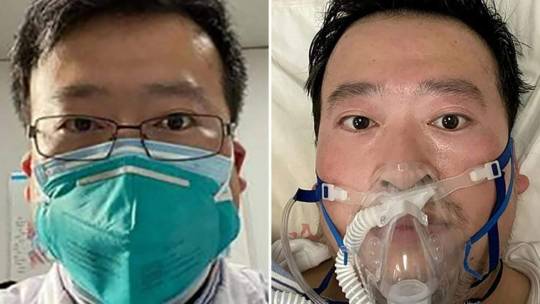
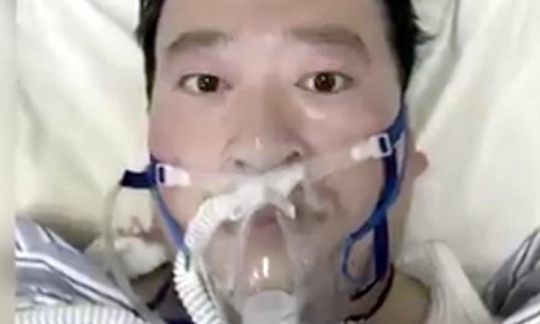
Rest in Peace 🕊️ Dr. Li.
#OnThisDay 4 yrs ago on 7 February 2020, Dr. Li Wenliang,
who first blew the whistle on the #coronavirus outbreak in December 2019, died of the infection as he warned the public about the new disease.
#WHO later named this new illness as #COVID19 on 11 February 2020. On 11 March 2020, WHO declared the novel coronavirus outbreak a global epidemic.
-https://asiatimes.com/2020/02/the-death-of-a-chinese-whistleblower/
-https://en.wikipedia.org/wiki/Li_Wenliang
1 note
·
View note
Text
🤷♂| HAPPY MONDAY?! 😷
#monday#happy monday#good morning#covid-19#coronavirus#pandemic#epidemic#cdc#covid#mondays#rush hour#omicron
0 notes
Text
youtube
Harming Children for the Appearance of Safety | Dr. Steve Templeton | EP 365
Dr. Jordan B. Peterson and Dr. Steve Templeton discuss his recent publication, “Fear of a Microbial Planet: How a Germophobic Safety Culture Makes Us Less Safe.” They break down the “discussed response” of the behavioral immune system, the pathogenic treatment of people during the COVID pandemic, the shift toward perceptual safety over common good, the programmatically induced fear that censors open discussion around these topics even now, and the impenetrability of those afraid, even when met with fundamental truths. Dr. Steve Templeton is the Associate Professor of Microbiology and Immunology at Indiana University School of Medicine Terre Haute, formerly CDC/NIOSH. Dr. Templeton is the author of the new publication, “Fear of a Microbial Planet: How a Germophobic Safety Culture Makes Us Less Safe.” The book examines pandemic responses, cultural and administrative, weighing historic examples against the COVID-19 pandemic.
#jordan peterson#steve templeton#discussion#covid#covid 19#coronavirus#pandemic#epidemic#schools#closure#kids#children#harm#tyranny#tyrannical#safety culture#fear#disgust#fear of a microbial planet: how a germophobic safety culture makes us less safe#book#masks#handwashing#hand sanitizer#culture#political#performance#Youtube
0 notes
Text
CVS beats on earnings and revenue but lowers profit outlook
CVS Health on Wednesday reported first-quarter results that beat earnings and revenue expectations, but the company lowered its full-year profit guidance due to costs related to recent acquisitions. The company’s shares fell more than 2% on Wednesday. Here’s what CVS reported compared with Wall Street’s expectations, based on a survey of analysts by Refinitiv: Earnings per share: $2.20 adjusted,…

View On WordPress
#Biotech and Pharmaceuticals#Biotechnology#Breaking News: Business#Business#Business News#Coronavirus#CVS Health Corp#Disease outbreaks#Epidemics#Health care industry#Pandemics#Politics#U.S. Economy
0 notes
Photo

Plague in the Ancient & Medieval World
The word 'plague', in defining a lethal epidemic, was coined by the physician Galen (l. 130-210 CE) who lived through the Antonine Plague (165 - c. 180/190 CE) but the disease was recorded long before in relating the affliction of the Plague of Athens (429-426 BCE) which killed many of the city's inhabitants, including the statesman Pericles (l. 495-429 BCE). This epidemic, and some of the others that followed, may or may not have been actual plague as it was later defined; ancient writers tended to use the term plague for any widespread outbreak of pestilence.
Plagues certainly may have existed prior to the Athenian outbreak – and almost certainly did – but most studies of the epidemic begin with Athens as it is the first recorded by an eyewitness and survivor, the historian Thucydides (l. 460/455 - 399/398 BCE). Plagues are routinely named either for the person who reported them, the monarch at the time of the outbreak, the region afflicted, or by an epithet as in the case of the Black Death.
The major recorded plagues of the ancient and medieval world are:
Plague of Athens
Antonine Plague
Plague of Cyprian
Plague of Justinian
Roman Plague
Near East Plagues
Black Death
Columbian Exchange Epidemics
Of these, the Columbian Exchange Epidemics are not considered plague as they were a sweeping contagion of smallpox and other diseases but were just as lethal to the indigenous people of the Americas as plague was elsewhere. Other epidemics not considered plagues but which still ravaged populations were leprosy – especially during the 11th century CE in Europe – and the Japanese smallpox epidemic of 735-737 CE. Epidemics and pandemics continued into the modern era and, among the deadliest, were the 1918-1919 CE Spanish Flu epidemic and the HIV/AIDS epidemic (1981-present) though there were many others. At the time of this writing, the Covid-19/coronavirus is proving itself the latest addition to the list of most lethal pandemics in world history.
Nature & Types of Plague
The cause of the plague was unknown until the 19th century CE when the bacterium Yersinia pestis was isolated and identified in 1894 CE. Prior to that time, plague was thought to be supernatural in origin, a punishment from the gods or God, and/or the result of a population's sin. The actual cause was Yersinia pestis which was carried in the fleas of rodents, most often rats, which transmitted the bacterium to humans through bites. Other animals could catch the plague by eating rats – or other rodents – which were infected and this would lead to an epizootic outbreak which then spread to human beings. People die of the plague because of the toxic nature of Yersinia pestis which compromises one's immune system while, at the same time, multiplying in the body. Since the compromised immune system can no longer fight against the toxins, the person dies.
Plague is always described as beginning with symptoms resembling the flu, which appear, usually, 3-7 days after one has become infected. The symptoms at first are chills, body aches, fever, and overall weakness, which then progresses to vomiting, diarrhea, dehydration, respiratory failure (in some cases), and death. The three types of plague are:
Bubonic: caused by the bite of a carrier flea. This plague attacks the lymph nodes, inflaming them, and the swollen nodes are then called buboes, hence the name.
Septicemic: caused by either an infected flea or contact with an infected animal. It attacks by entering the bloodstream and multiplying.
Pneumonic: caused by contact with an infected animal and spreads person-to-person through coughing. It attacks the lungs, rapidly multiplying, which triggers an immuno-response eventually shutting the lungs down and leaving the person to die of respiratory failure.
Of the following, the first three may or may not have been plague. Descriptions of them by eyewitnesses suggest they may have been typhus or smallpox outbreaks but could have been plague.
Continue reading...
34 notes
·
View notes
Text
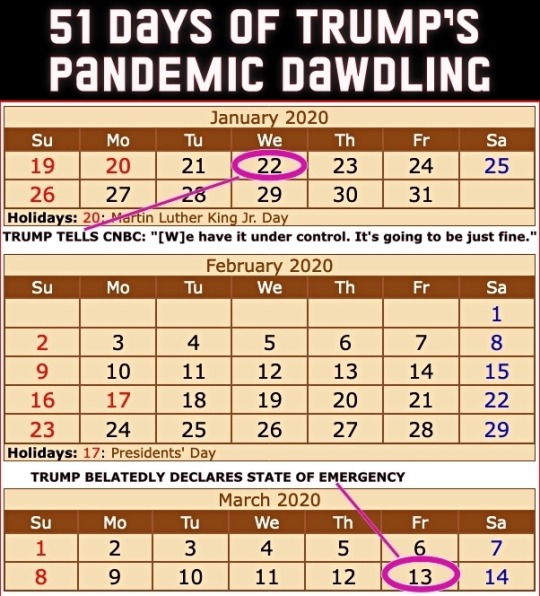
Four years ago today (March 13th), then President Donald Trump got around to declaring a national state of emergency for the COVID-19 pandemic. The administration had been downplaying the danger to the United States for 51 days since the first US infection was confirmed on January 22nd.
From an ABC News article dated 25 February 2020...
CDC warns Americans of 'significant disruption' from coronavirus
Until now, health officials said they'd hoped to prevent community spread in the United States. But following community transmissions in Italy, Iran and South Korea, health officials believe the virus may not be able to be contained at the border and that Americans should prepare for a "significant disruption." This comes in contrast to statements from the Trump administration. Acting Department of Homeland Security Secretary Chad Wolf said Tuesday the threat to the United States from coronavirus "remains low," despite the White House seeking $1.25 billion in emergency funding to combat the virus. Larry Kudlow, director of the National Economic Council, told CNBC’s Kelly Evans on “The Exchange” Tuesday evening, "We have contained the virus very well here in the U.S." [ ... ] House Speaker Nancy Pelosi called the request "long overdue and completely inadequate to the scale of this emergency." She also accused President Trump of leaving "critical positions in charge of managing pandemics at the National Security Council and the Department of Homeland Security vacant." "The president's most recent budget called for slashing funding for the Centers for Disease Control, which is on the front lines of this emergency. And now, he is compounding our vulnerabilities by seeking to ransack funds still needed to keep Ebola in check," Pelosi said in a statement Tuesday morning. "Our state and local governments need serious funding to be ready to respond effectively to any outbreak in the United States. The president should not be raiding money that Congress has appropriated for other life-or-death public health priorities." She added that lawmakers in the House of Representatives "will swiftly advance a strong, strategic funding package that fully addresses the scale and seriousness of this public health crisis." Senate Minority Leader Chuck Schumer also called the Trump administration's request "too little too late." "That President Trump is trying to steal funds dedicated to fight Ebola -- which is still considered an epidemic in the Democratic Republic of the Congo -- is indicative of his towering incompetence and further proof that he and his administration aren't taking the coronavirus crisis as seriously as they need to be," Schumer said in a statement.
A reminder that Trump had been leaving many positions vacant – part of a Republican strategy to undermine the federal government.
Here's a picture from that ABC piece from a nearly empty restaurant in San Francisco's Chinatown. The screen displays a Trump tweet still downplaying COVID-19 with him seeming more concerned about the effect of the Dow Jones on his re-election bid.

People were not buying Trump's claims but they were buying PPE.
I took this picture at CVS on February 26th that year.
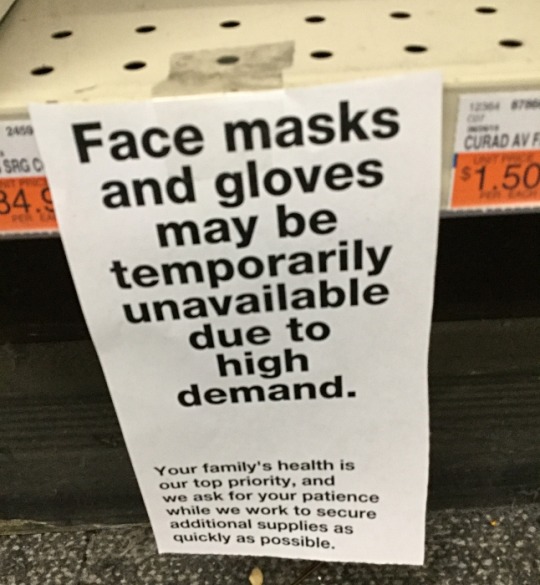
The stock market which Trump in his February tweet claimed looked "very good" was tanking on March 12th – the day before his state of emergency declaration.
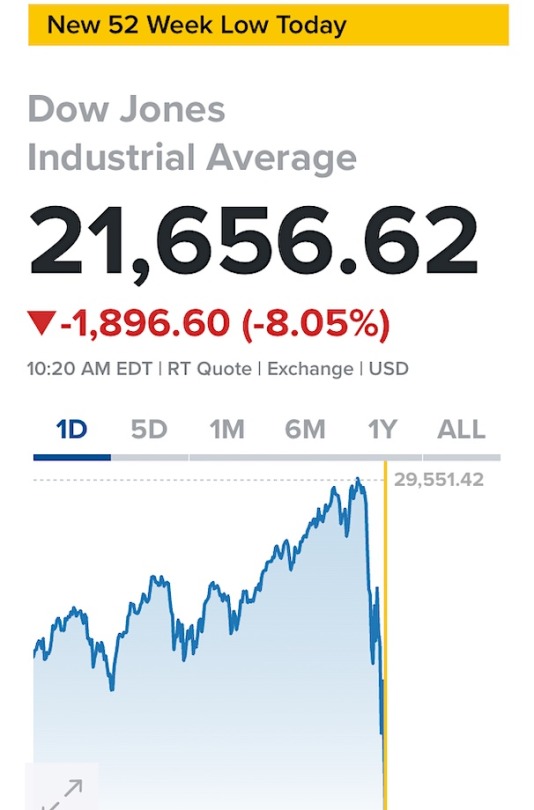
Trump succeeded in sending the US economy into recession much faster than George W. Bush did at the end of his term – quite a feat!. (As an aside, every recession in the US since 1981 has been triggered by Republican presidents.)
Of course Trump never stopped trying to downplay the pandemic nor did he ever take responsibility for it. The US ended up with the highest per capita death rate of any technologically advanced country.
Precious time was lost while Trump dawdled. Orange on this map indicates COVID infections while red indicates COVID deaths. At the time Trump declared a state of emergency, the virus had already spread to 49 states.

The United States could have done far better and it certainly had the tools to do so.
The Obama administration had limited the number of US cases of Ebola to under one dozen during that pandemic in the 2010s. Based on their success, they compiled a guide on how the federal government could limit future pandemics.
Obama team left pandemic playbook for Trump administration, officials confirm
Of course Trump ignored it.
Unlike those boxes of nuclear secrets in Trump's bathroom, the Obama pandemic limitation document is not classified. Anybody can read it – even if Trump didn't. This copy comes from the Stanford University Libraries.
TOWARDS EPIDEMIC PREDICTION: FEDERAL EFFORTS AND OPPORTUNITIES IN OUTBREAK MODELING
Feel free to share this post with anybody who still feels nostalgic about the Trump White House years!
#covid-19#coronavirus#pandemic#public health#donald trump#trump's incompetent response to the pandemic#covid state of emergency#2020#trump recession#51 days of trump pandemic dawdling#obama pandemic playbook#2010s ebola outbreak#nostalgia for trump administration#republicans#election 2024#vote blue no matter who
113 notes
·
View notes
Text
Also preserved in our archive
By Tamino Dreisam
The World Socialist Web Site previously described Germany’s 2025 federal budget as a “war budget dictated by capital.” While billions are being spent on armaments and arms packages for Ukraine and Israel, vast cuts are being made to health and social services, including the planned cancellation of epidemic wastewater monitoring for COVID-19 and other pathogens.
The “Wastewater Monitoring for Epidemiological Situation Assessment” (Amelag) went into operation in 2022 and examines wastewater samples from up to 175 sewage treatment plants nationwide, searching for gene copies of coronaviruses on a weekly basis. Even if it is not possible to determine the exact incidence rate, Amelag provides information on whether the infection rate is growing or declining and where outbreaks are occurring. Waves of infection can also be recognised at an early stage.
Especially since the abolition of mandatory personal testing and all other coronavirus protection measures, wastewater monitoring is one of the most informative tools for determining the status of the pandemic. The planned abolition of this vital public health program illustrates the aggression and criminality with which the ruling class is enforcing the “forever COVID” policy. It not only spreads the lie that the pandemic is over, it also seeks to eliminate all data that proves the opposite.
Amelag’s federal funding expires at the end of the year and there are no plans to extend it. A spokesperson for Health Minister Karl Lauterbach (Social Democrat, SPD) confirmed: “Unfortunately, no funds for the continuation of wastewater surveillance could be included in the government’s draft federal budget for the time being.” Although attempts were being made “in the course of parliamentary deliberations to obtain funding for continuation,” it is quite clear that these are just empty phrases. In government questions in the Bundestag (parliament), Lauterbach attempted to shift the funding to the municipalities, which are already in debt as it stands. “The federal government is not responsible for every sensible expenditure,” he explained.
Last year, Lauterbach announced the cancellation of funding for research into Long Covid and the development of therapies and medicines to combat it. The cut from €100 million to €21 million was justified with claims of a “tight budget situation.” He thus made it clear where this cancelled money was going: into military armaments, the only area of the budget to be significantly increased. With regard to the continued operation of Amelag, the Robert Koch Institute (RKI) public health body explained that only €5 million per year would be necessary—that is, 0.8 percent of the sum of Germany’s most recent military support package for Ukraine.
A petition addressed to the Federal Ministry of Health on change.org under the title “Stop the end of AMELAG! Germany needs modern epidemiology” already has over 4,500 signatures. It explains: “Modern epidemiological surveillance is based on collecting data as quickly, comprehensively and unbureaucratically as possible. As the Sars-CoV-2 pandemic shows, modern surveillance systems are more necessary than ever in a globalised world affected by the overexploitation of natural resources.” The petition goes on to castigate the government’s abolition of all measures, noting, “Contrary to the experience of modern medicine, for the first time in human history we are relying on individual responsibility to overcome a pandemic.”
Many signatories of the petition write in their explanatory statement that the COVID-19 pandemic is not over and that they themselves have already fallen ill with Long Covid.
Just how drastic the situation is, is also shown by the figures for the rising autumn coronavirus wave. According to the RKI’s latest weekly report on acute respiratory illnesses (ARI), 7.4 million people are currently suffering from acute respiratory diseases—a particularly high level for this time of year. COVID-19 directly accounts for around 22 percent of these. However, it is quite clear that the unhindered spread of COVID in recent months and years has weakened the immune systems of millions of people. As a result, they also fall ill more easily with other forms of ARI.
COVID-19 currently accounts for 17 percent of the number of severe ARI cases, although there are clear age differences, with COVID-19 accounting for 30 percent of severe respiratory illnesses in the over-80 age group.
Wastewater levels of COVID have sharply increased since mid-September. Last week, 239,000 gene copies per litre of wastewater were measured, while in the previous week the figure was 185,000. The viral load has doubled in the last four weeks. According to GrippeWeb, which collects data on the incidence of infection based on information from a test group of volunteers, the estimated COVID incidence is currently around 1,100.
The number of hospitalisations is also rising slightly and now stands at a 7-day incidence of four hospitalisations per 100,000 inhabitants. The number of deaths rose to 129 last week, compared to around 80 per week in the previous weeks.
The dominant variant is currently KP.3.1.1, which accounts for 41 percent of infections. The recombinant sublines now account for 27 percent, with virologists estimating that XEC has around twice the growth advantage of KP.3.1.1 and will be the dominant variant in winter.
In the UK, British GP Helen Wall reported in a recent interview with the Manchester Evening News that she has observed a difference between XEC and previous infections in her practice. Anyone infected with this variant should be prepared to feel “knocked out.” She explained: “Previous symptoms were more like cough and cold symptoms, but at the moment Covid seems to be really knocking people out.”
The long-term effects of COVID-19 are also being increasingly discussed. Broadcaster SWR recently published a report on the first anniversary of the post-COVID outpatient clinic in Mainz. The internist interviewed, Christoph Lembens, reports that more than 1,000 patients had already been treated in these twelve months. The appointment diary was still fully booked well into next spring.
Lembens estimates that around a fifth of his patients have not recovered from their COVID infections. This not only affects older people with previous illnesses, but also many younger people. Those affected suffer from exhaustion and fatigue. Some of them also have severe circulatory fluctuations, for example an extreme drop in blood pressure as soon as they stand up, which can lead to their simply falling over.
For many, it gets even worse: they may also have major muscular problems, so that some sufferers are dependent on a wheelchair. Many have cognitive impairments, including “brain fog,” making it extremely difficult to concentrate or memorise things.
These reports illustrate the criminal nature of the ruling class “forever COVID” policy, which has condemned hundreds of millions globally to suffer long-term damage to their health so that profits continue to flow.
#mask up#covid#pandemic#public health#wear a mask#covid 19#wear a respirator#still coviding#coronavirus#sars cov 2#Germany#class war
44 notes
·
View notes
Text
Insane and brain-dead.
pairing-Simon 'Ghost' Riley/You. Very little John 'Soap' MacTavish/You
Chapter WARNING- Description of blood, cruelty, tin.swearing, partial description of decomposition, mention of suicide. My vision of the characters
Summary - 'There is no love'-that's what Simon thinks. BUT what if two traumatized and mentally wounded people meet in a hellish apocalypse and find solace in each other?Hundred what if what happens to them connects them?.
(the end will be good)
This is the first, introductory chapter.
Part one.
It is no secret that viruses and bacteria mutate at an amazing rate, either changing their genetic code and causing mutations, or changing so much that there is already a problem of a new strain. Today, viral mutation is a common phenomenon that does not scare people in the least. Many people do not even think that someday this microorganism can cause harm, ignoring all those stories of fatalities, great and terrible epidemics that have happened to mankind, naively believing that if it happened a thousand years ago, it certainly will not affect you.
How many people know about the Antonine Plague? Although, by the way, it was the most horrifying epidemic in history, which killed more than 5 million people, and according to records, killed 2 thousand Romans a day.And the bubonic plague? It's frightening when you think of the descriptions in books: fever, nausea, hallucinations, pus-filled buboes, death, and people in bird masks. So what? That's right, nothing. Remember when the coronavirus wasn't taken seriously? A lot of people thought it wouldn't reach the regions, states and cities, but it did.
Just like this time, no one took it seriously when dozens of reports were projected from a small town about a sudden outbreak of "rabies", forcing the sick to die in hellish agony within minutes, and then rising up like stereotypical zombies to bite everyone they came across, succumbing to the virus' natural call to multiply.
Really, who'd believe it? And for nothing. After the first newscasts, a wave of memes and jokes started among the schoolchildren, while the adults, lost in the cycle of work, family, and household chores, paid no attention as the small town of Corrins struggled to cope with the sudden and unknown threat. The town government was going crazy-people were refusing to work, refusing to go outside, and even the patrolmen were going on strike. But the infected were unstoppable. Even a hundred people were already tangible, and where there were a hundred, there were a thousand people, and where there were a thousand, there were two.The city was slowly dying until no one took it seriously. Why didn't anyone move out? The answer was simply that they couldn't. Corrins was quarantined, a total lockdown, no entry or exit. When did that ever work? There's not even a movie where a flimsy gate and guards stopped a horde of infected.
The infected huddled together, roaming the streets like mindless, attacking anyone they could catch.
The virus was spreading as fast as anyone could have imagined, and seemingly in ways never before recorded in history. In just a week, the city of Corrins had fallen into oblivion, along with three other towns in the vicinity, followed by the entire region.
Dim light shone through the thick navy-colored curtains, softly illuminating the room. Simon Riley, a former British mercenary who had just awakened from another night of nightmares, sat in the kitchen chair, leaning back casually, foot on foot and hand under his head, staring into the void. For the third time he was dreaming episodes from his past. Dreams about his goat father no longer frightened him, no longer made him nervous like the dreams about the team that Simon had grown accustomed to during his ten years on the job. Now, after the severe injuries, the difficult and sometimes deadly missions, the adrenaline that bubbled in his blood day and night, life in retirement seemed like hell. For the first few days he, like his guys, was in a depressed mood, not understanding why they were forced to retire so early, but none of the superiors explained anything, giving a completely stupid answer that was the same for everyone: "We changed priorities". That day was hard for everyone. but, nevertheless, the guys did not forget each other. Living in the same city, they often gathered in the bar "Ricky and Mickey", discussed personal matters, tried to rebuild their lives on a new way. And for Riley, worrying about what to cook, trying to build relationships, job hunting, and constantly changing activities were hated, so his thoughts often returned to the days when he and John and the guys worked together. When adrenaline was bubbling in his blood and his brain was working on emergency decisions and tactics. Being on the rope gave life an unrealistic drive, helping him forget the horrors of his childhood. Sometimes, however, he was afraid - those were the rare occasions when things didn't go according to plan and his companions could get hurt. Simon wasn't afraid for himself, he wasn't afraid of bleeding out on the battlefield, getting shot, or even losing a leg or an arm, but the image of a bleeding comrade made him shudder inwardly, still vivid in his mind's eye: He'd been shot in the head-unfortunate and nearly fatal, if it hadn't been for the plate in his skull-the miracle that had saved Johnny from certain death in this cold and filthy place.
That day Simon Riley almost died for the third time. The first time Riley had experienced such deep emotions was in his childhood, when his father, an alcoholic and deeply addicted to drugs, had mocked him. The image of his father with a viper in his hand and the devil-like image of his older brother would haunt Simon's dreams and visions for a long time. The second time it was the image of his mother. The fragile woman who was pulling the whole family on her own back, tolerating her abuser of a husband day after day, humbly going to hard work, trying to earn at least some pennies, couldn't stand it and put a bullet in her temple. She lay on the old and creaky couch for almost twenty-four hours before her husband paid attention. Simon remembers like yesterday her small, thin body lying stiff and stiff on the couch, with a humble face like a painting of The Death of the Virgin Mary by the artist Caravaggio. She was dressed in her pale pink robe, and her thin hand rested on her breast. Mrs. Riley tried her best to hold on for little Simon's sake, but she could not endure her eldest son's abuse and her husband's hatred, killing herself and finally achieving the peace and quiet she so desired. Little Simon sat with her all day, trying his best to wake the lying woman, covering her face with a damp cloth, gently stroking her icy hands. He was only six years old then, when he stood over the pit where the old wooden coffin containing the body of his beloved mother lay.
And then, when Johnny had been injured, Simon felt again like he did then at six years old, next to his mother. He, lost in emotion, grabbed Johnny's head, his hands trying to cover the bullet wound, roughly grasping like a child trying to help as best he could. The ghost doesn't remember Price dragging him away from Johnny's unconscious body, giving room for the paramedics to arrive.
John 'Soap' MacTavish was taken to the medical unit and underwent emergency surgery, Sitting in the dark and empty corridor, Ghost was out of breath as Gaz and Price tried to support him. "John's a tough guy, he'll get over it." And the this jerk turned out to be fucking resilient. And lucky too.
After that the band didn't last long-quite a couple months later they were dismissed, without reason or much explanation, taking them out of their positions. Of course no one expected it, but what was to be done?
Simon picked up his phone, checking messages, secretly hoping for another invitation to a bar, just to avoid the domestic routine, but instead of the pleasant words "let's go for a cognac," he came across a sweet and sweet message from Amanda, the girl Ghost had tried to meet at his leisure, when Soap was once again blowing his mind about the need for a relationship.Amanda was undeniably beautiful-blonde curls, blue eyes, and charmingly pouty lips, but the problem was that as soon as she opened her mouth, everyone wanted to shut her up. Amanda Hess was a meticulous Shopping Fanatic, and "miss fucking amazing ideas." In places, undoubtedly, the idea of going to fuck in the park at one o'clock in the morning excited Simon, but frankly, he lacked enthusiasm, and for the fifth time, hearing an unusual idea, his eyes involuntarily rolled with stupidity.
Simon and Amanda had been talking for about three months now, and he didn't know if he liked her or if he liked her ass, or if he even needed these dates.
"Honey, can you pick me up at eight pm?" -said the message, and attached to it was a nude photo of a girl sitting on the edge of a bed with her feet up and taking a picture of herself through a mirror, wearing only black lace lingerie. Beautiful, but unimpressive. When you see the same tits and hear the same things, you get used to it and the panties photo is no longer arousing. Inwardly Simon wished for soulfulness and some kind of domestic affection, maybe a cozy lady dressed in his huge warm sweater and striped socks, making hot chocolate.
"I'm busy," Simon answered rudely but habitually, but no sooner had he sent a message back than someone slammed the front door, forcing him to look up and away from the phone.
"Fuck," Soap said, panting and trying to catch his breath, leaning his hands on the walls. His eyes darted around the room, searching for the scowling lieutenant and finally seeing his comrade, Johnny rushed over to him, speaking quickly and nervously. "Hey L.T., did you see what the fuck is going on? We're fucked, we're fucked up a bloody fucking ass that can't be compared to Makarov's ugly face."
Simon grinned wryly as he listened to MacTavish and sat just as casually in the kitchen chair, watching Mr. Mohawk walk around his kitchen, looking for the TV remote and finally finding it, turning it on as he continued to mutter-"Fucking lunatics flooding the streets! I thought I'd never bloody get to you-the police are shutting down the city, ambulances everywhere!"
And as John spoke, Simon lowered his gaze to the phone again, wistfully noting that Amanda's message was from yesterday and apparently he hadn't noticed it. Soap snatched the phone out of Simon's hands, carelessly tucking it away on the table, speaking seriously, frowning his bushy eyebrows. "Buddy, can you hear me? I'm dead serious right now."
"You can't be serious about piles of zombies roaming the street," Riley replied, looking up at his friend again. Behind him, while no one was paying attention, the coffee was frothing, running off and dirtying the stove, leaving a bitter burnt odor that Simon sensed and immediately moved the coffee pot. "Bloody hell, John."
"Leave your fucking coffee, this isn't a joke, Lieutenant," John shrieked, finally turning his attention back to Simon.
On TV, a slender girl in a business suit with a serious face and a monotonous voice was giving an interview; in the background, behind her were several police cars, ambulances, and even a SWAT team flashed in the frame. Somewhere very far away there were shouts of people, special forces, passing information to each other. The girl's voice was steady and didn't even shake as she broadcast almost robot-like.
"Today, around six o'clock this morning, a group of unknown assailants attacked the locals. It's probably an outbreak of rabies. The patients have pale skin, cloudy eyes with red spots and gritted teeth, some cases of hemoptysis, poor coordination and slurred speech. If you find such symptoms in yourself or your relatives, call the number 'xxx-xx-xx-xxx'. We urge all citizens to stay in their homes until the next announcement. You are also reminded to lock your windows and doors and do not let anyone suspicious in."
"You heard her, it's just an outbreak of rage," Simon waved his hand nonchalantly, to which John, eyes wide, shouted again, trying to reason with his colleague.
"You don't fucking understand." -MacTavish clutched the remote tighter, rewinding the videotape of the interview to the very end.
"I don't understand what?" -Ghost raised his eyebrows skeevily.
"She's dead"-John said sharply, including the very end of the video, where a man in an ambulance corpsman's uniform comes at the journalist from behind. He sinks his teeth into her neck, biting off a large chunk almost immediately, his bloody hands grasping her shoulders as the girl screams frantically. Simon's eyes slowly open as his brain's mechanisms process the information. It's as if he believes it, but the other half of him screams "It's all a lie, a joke. April 1." Unconsciously he looks at his phone, checking the date and realizing to his horror that the first of April is long gone and it was June. The information and realization pressed on his brain, causing goosebumps to crawl across his skin. A slight fear bubbled in his stomach as he watched Soap's actions as if mesmerized. John frantically opened every drawer in the kitchen, looking for any canned goods and bars.
"Shit, LT, what are you eating? Don't you have any?!" exclaimed Soap, panic-rushing through the rooms while Simon came to his senses.
"Bottom drawer on the right"-as Riley answered mesmerized. John, opening the cabinet and seeing five cans of canned chicken and pork, exhaled, immediately pulling them out and placing them on the table.
"Don't delay, Ghost, get the damn things together. I was able to get a hold of Price, he and Gaz will be waiting for us on the outskirts of town at the cottage plots. Price is trying to contact Laswell and the department." Soap rummaged through the drawers, pulling out matches, knives, and anything else he thought might come in handy. Recovering and hearing shouts outside the door, Simon jumped up and immediately began grabbing his belongings and dumping them at speed into his hiking backpack. The screams were getting closer and it seemed like the entire apartment building was shaking with people running, panicking and screaming. Simon's apartment was right in the middle of the building, on the fifth floor, and it was damned inconvenient.
At last, Ghost jerked the curtains aside carelessly, peering out the window and watching in horror at the sheer chaos. He had never seen anything like this even in the army. From the neighboring apartment building, people were falling from the balconies, one was already infected, and the other, Simon's acquaintance, Edgar, a man with three loans and perpetually bawdy jokes, had thrown himself out of the window, not wanting to fight, nor to be infected and converted. Unwittingly, Simon remembered how they'd sat at the bar and the jerk with the black, curly beard would see any girl off with a meow, stretching out his catchphrase, "Your pussy's in danger next to me." Then, for Riley, it was a show, at the end of which Edgar was guaranteed to get slapped by some extravagant girl.Now he was dead. In the sky we could see helicopters crashing one after another, one of them crashing right into the house, partially destroying the building. The wreckage flies down where the crowds are, and at first glance it's hard to see what the crush is all about: screams and heartbreaking cries from everywhere, and the special forces are trying to get everyone out of the way, but they, too, the men in uniform and ammunition, suffer the same fate as the civilians - to be bitten. Suddenly Simon is yanked away from the window. Jonny, hearing something going on outside the apartment, realizes it's time to run. - "Damn! We're all going to die in here!"
The ghost followed Soap, and as the other opened the door, the growling grew louder. At the end of the corridor was a small flock of zombies - apparently residents of neighboring apartments that were infected.Without thinking long, the Comrades rushed to the stairs-an escape route. Suddenly, the door swings open in their faces and an older woman falls out into the hallway with a loud hiss. John reflexively shoves the old woman away from him, and Ghost reflexively hits her with the bat he'd brought just in case. "Oh bloody hell, I'm sorry Mrs. Ruzzet," Simon says nervously as he hurries forward, almost flying down the stairs, missing the steps. The zombie old lady lets out another clanking of teeth as she tries to crawl after them, but they've already broken away. Floor after floor flies by at speed, with only a door ahead. John pushes that one open, but it's like it turns out to be locked. "The fucking lock's jammed, Simon, help!" The sounds of zombies are coming closer, and Riley could swear she can hear them dragging their feet on the floor. Strike one. Nothing happens. Second strike. The smell of stinking zombies is getting closer and old Ruzzie is already sliding down the stairs with broken legs, dragging herself with her arms. Third strike. Simon stands behind Soap with bat in hand, the wooden handle cracking from his grip. Four. The door opens and John reflexively grabs Simon by the collar of his shirt, pulling him outside.
It's fucked.The smell of burning, blood and decomposition was everywhere, the dead trying to get to the last survivors who dared to go outside. A girl ran past Simon, clacking her high heels with a loud squeal while three well-fed zombies with bloody mouths with blood dripping from them, staining their clothes, almost ran after her. John rushed towards the cars, picking his way through them with a slight ducking, while Ghost followed behind him, looking back and keeping an eye out for single zombies. The path through the yard was relatively clear, if it weren't for a pack of zombies in suits crouching over a corpse and ripping apart their once office colleague. "That's what 'eating the boss's brains out' means," John grinned grimly, and Simon only chuckled.
"We can walk along the edge and hope the bastards are too focused on their coworker," Simon suggested, and John nodded, slouching, hunching over and almost pressing himself against the wall. The zombies, too focused on their food, wouldn't have noticed him if it hadn't been for John's sudden cry of, "Fuck!" With a snarl, they turned their heads toward the living humans, slowly rising, moving their hollow-headed bodies forward. Simon turned to John, who was swearing to himself as he tried to kill the crawling zombie: it was half a body, the upper half, and from the stomach on up, there was nothing, just part of the spine, but it was tough. Hurriedly, Simon grabbed his friend by the wrist and swiftly dragged him away from the alley.
They made their way to the outskirts of the city, but they couldn't stop there because all the neighborhoods were crawling with zombies.
"I'm damn glad your attraction to life on the outskirts cut us a hell of a lot of slack. It wasn't as shitty when I got to you as it is now," John tried to catch his breath. How many kilometers had they run? It wasn't clear, but it was a lot, though they were used to long runs, and their goal was to get to Price's country house as fast as possible, even if it was a hell of a long way.
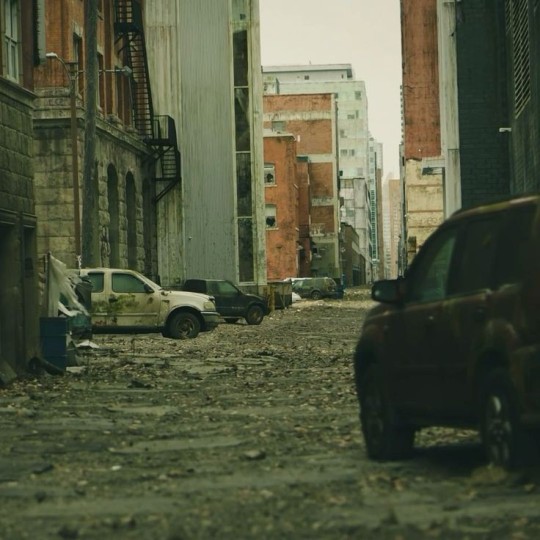
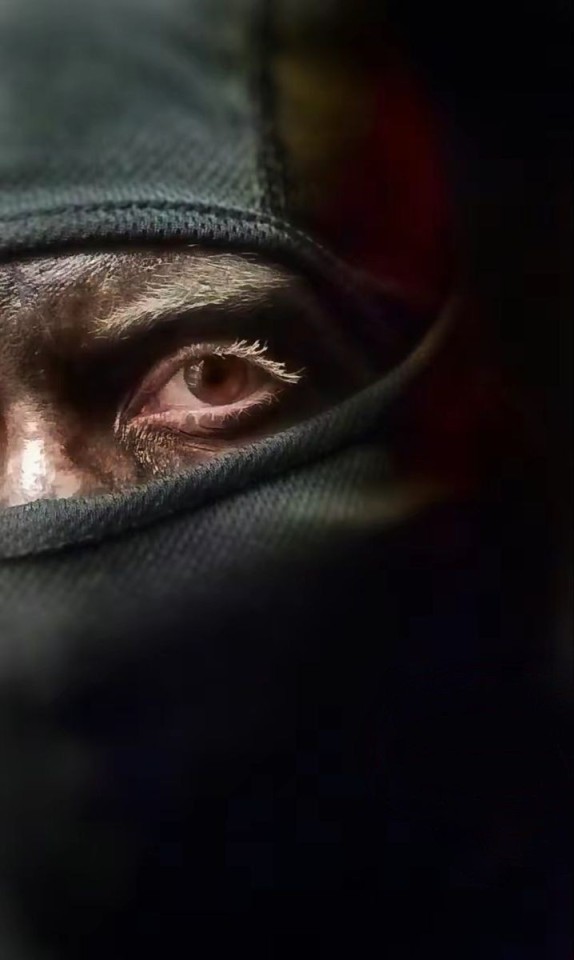
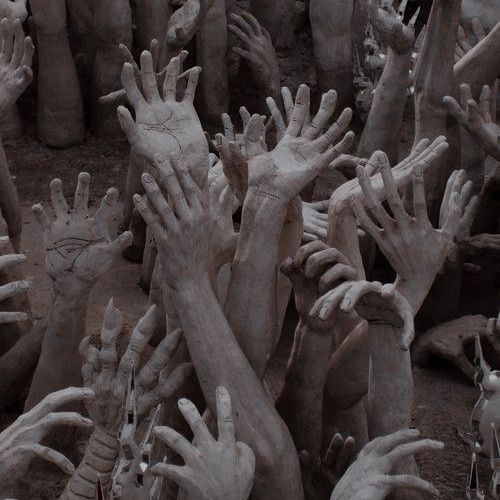
#ghost cod#simon ghost riley#simon ghost riley x reader#cod#cod x reader#fanfic#simon riley#simon riley x reader#soap x reader#soap cod#john soap mactavish#captain john price#gaz cod
21 notes
·
View notes
Text
"During the global coronavirus pandemic, China built dozens of makeshift hospitals and state quarantine centers, some out of steel container boxes. They became closely associated with the anxiety of mass testing and the fear of sudden lockdowns.
Now, cities are turning the huge centers into affordable housing units for young workers in an attempt to revive the country's economy post-COVID...
Just over a year ago, these apartments were used very differently: for medical triage and quarantine facilities. Beijing alone built 23 of these makeshift facilities, designed to hold up to 23,000 people at a time.
"It was not very cold yet but they told me to pack my belongings," remembers Hudson Li, a Beijing resident who was quarantined in one of these facilities, called fangcang in Chinese, in October 2022...
Less than two months after Li was quarantined, Beijing lifted most of its COVID restrictions. Li says he still associates the fangcang with a feeling of helplessness and fear: "It has been over a year already, but I definitely have PTSD from the pandemic, from the fear of scarcity and having to stock up on a lot of medicine and food."
Attracting young tenants with low rents
Now the fangcang across the country are undergoing a minor transformation and turned into apartment units for young graduates like Li. The changes are an effort from local authorities, who have been tasked with restarting economic growth and supporting small businesses after nearly three years of ruinous lockdowns.
Populous cities like Beijing are also trying to bridge the housing affordability gap between high real estate prices and low salaries, on average, for young workers. In the northeast corner of the capital city, near its airport, one fangcang with more than 4,900 units has been rebranded the "Jinzhan Colorful Community" — a reference to the bright hues of paint — and now offers amenities like a canteen where residents can grab a cheap meal before or after work.
Another fangcang facility, in the northeastern city of Jinan, has been turned into 650 units for skilled workers inside an industrial park.
"Given that the current overall [COVID] epidemic situation in the country has entered a low level, revitalizing the fangcang for other housing purposes is worth learning and thinking about all over the country," Yan Yuejin, a housing analyst, told Chinese media.
The fangcang, once a symbol of containment, are now supposed to represent dynamism and growth.
"I have complex feelings about this. The facilities were built using public funds and not rented out transparently," Li says. "But I do have to say you will not get anything more affordable than these apartments. They are very price competitive."
A list of rental prices for a Beijing fangcang converted into apartments shows most rooms are Rmb1200 (USD $170) a month, low for Beijing."
-via NPR, December 9, 2023
#china#covid#quarantine#affordable housing#housing#beijing#jinan#apartments#real estate#housing crisis#cost of living#good news#hope
80 notes
·
View notes
Text
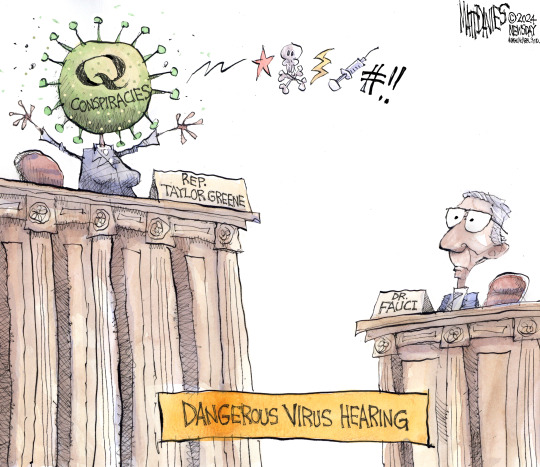
At-Large Marge. http://Newsday.com/matt :: Matt Davies
* * * *
The lesson of Covid
June 4, 2024
ROBERT B. HUBBELL
The United States suffered more deaths from Covid than any other nation in the world (1.13 million) and the highest death rate (341 per 100,000) of any large, high-income country. Those shocking facts suggest that a congressional inquiry is urgently needed to understand why the US fared so poorly compared to other industrialized nations.
On Monday, the Select Subcommittee on the Coronavirus Pandemic held a hearing ostensibly designed to understand why the US response to Covid paled in comparison to the responses and outcomes by countries like the UK, Spain, Italy, France, Sweden, Australia, Canada, and Netherlands.
You will not be surprised to learn that the hearing did not devote time to understanding what the US could do better in response to the next pandemic. Instead, Republicans converted the hearing into an evidence-free attack on Dr. Fauci’s selfless, expert guidance through a pandemic that killed approximately 1 out of every 300 Americans. See, e.g., Newsweek, Dr. Fauci Testifies: Unvaccinated Americans Caused Additional "200-300k Deaths".
Led by Marjorie Taylor Greene and Jim Jordan, Republicans peddled baseless conspiracy theories that will kill tens or hundreds of thousands of Americans in the next pandemic—just as vaccine hesitancy and disinformation killed hundreds of thousands of Americans in the last epidemic.
Convicted Felon Donald Trump broke the Republican Party when he elevated loyalty to him above belief in the truth. The disgraceful conduct by Republicans in today’s Select Committee hearing is the direct product of Trump's assault on the truth.
A nation cannot govern itself if it creates policy and passes legislation based on fever dreams and mass delusion. Truth matters. Lies matter. That may be the most important lesson of the coronavirus pandemic. It came at a dear cost: The deaths of 1.1 million Americans. We should never forget that lesson or the losses suffered by tens of millions of family members—or we may be condemned to repeat the tragedy in the next pandemic.
[Robert B. Hubbell Newsletter]
#Robert B. Hubbell Newsletter#Robert B. Hubbell#COVID#Dr. Fauci#MAGA conspiracy theories#global pandemic#US House of Representatives#evidence-free attack
10 notes
·
View notes
Text
⬇LINK⬇
☞ Covid isn’t over, but even the most cautious Americans are moving on...
--The Washington Post, 6/25/23
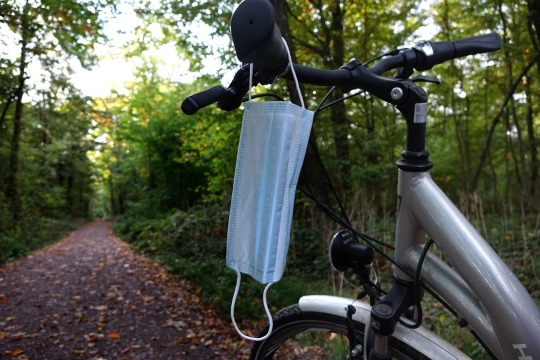
youtube
**😷 | Our Long National [Global] Nightmare. . .**
#reading#critical thinking#covid-19#coronavirus#social distancing#quarantine#lockdowns#health#news#current events#4th of july#independence day#USA#Freedom#epidemic#pandemic#endemic#conspiracy theories#conspiracy theory#super-spreader event#Friday#happy friday#Summer#omicron#paxlovid#lab leak theory
0 notes